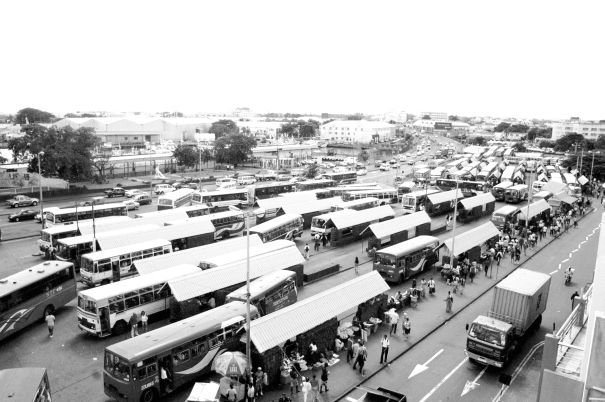Jonathan Richmond: “We Already had a Blueprint for Improving the Bus Network in Mauritius”

How have you found as Transport Advisor to the Government of Mauritius?
I stumbled upon the use of Mauritian government has, that is to say the position of 'Transport Advisor'. I had when I was a consultant to the World Bank, had the opportunity to visit Mauritius in some studies on the transportation industry. I applied and got the job.
I noted that many reports were commissioned to reform the transportation industry, but no action was taken afterwards. So I decided to gather all representatives of industry players. Or 20 people in total. When we met, I made sure that the operators agree on an action plan. Of the 20, only one person had spoken against. The sharing our opinions was one of my best experiences in Mauritius, but I would also know bad.
Despite your proposals, the government procrastinated much, do you understand why?
After the submission of proposals, the government has missed the opportunity to reform the sector. By grouping all entities in the transportation industry, as an authority, the Land Transport Authority, we would offer 'incentives' to improve the management and 'accountability' to avoid corruption cases are legion in the existing entities. But unfortunately corrupt people or causing mismanagement nothing wanted to change and lobbied to prevent the implementation of these proposals.
And yarn needle, the minister, who was at that time Rashid Beebeejaun, changed attitude towards me. As the minister happened then, he has never spoken to me or agreed to be cooperating. My religion has even become an excuse to get rid of me. So when my contract expired, I am left with the conclusion that Mauritius remains an immature country with a big racial problem that prevents you from moving forward.
What happened after that?
After leaving, the legislation was passed, but no changes were made to the transportation industry. The Bus Way option, for example, was a good option that would have helped to infuse new life into the bus industry. I know there is much talk of light rail, but this project is not appropriate for Mauritius. Effective implementation of the new Land Transport Authority was designed with standards to promote healthy management has simply been delayed by lack of cooperation.
Do you regret having worked for the government of Mauritius?
It should be noted that the plans were ready to be implemented. To return to the draft Bus Way, we already had a blueprint for improving the entire bus network in Mauritius. I worked with companies and bus unions to protect and include everyone. It was the chance to breathe new life in the transport sector in Mauritius, and demonstrate the seriousness of the government. Unfortunately, it's ruined because of the inability of the Prime Minister to impose discipline.
This is not only a tragedy, but it is also a shame because Maurice had the chance to move forward and change. Recently, the Asian Development Bank has invited me to give a public lecture in Manila on corruption. I shot a lot of examples from my experience in Mauritius during this presentation.
Richmond Report (2006): "The buses do not have enough consideration for passengers'
The transportation industry is at the heart of the news. Buses are often criticized for the service offered to Mauritian taxpayers. An often fatal service. However, in 2006, a British expert, Jonathan Richmond, Transport Advisor appointed as the government had already highlighted the shortcomings of the bus system in Mauritius, and focused on a reform of the transportation industry.
Various reports have been commissioned but in fact the transport sector remains a thorn in the Mauritian economy. The country loses about Rs 2 billion per year due to traffic congestion. In 2006, Jonathan Richmond was appointed as Transport Advisor by the Mauritian government to yet another attempt to balance the sector. According to this expert transport, its approach "in September 2006, allowed to break more than a decade of deadlock in transport policy in Mauritius."
Direction had been drawn by the expert. These recommendations, a package of 18 measures were presented to Cabinet of Ministers after consultation with all stakeholders in the transport industry. 19 representatives of 20 (bus companies and labor unions in the transportation industry) had accepted his proposals, had said Jonathan Richmond.
During the presentation of this report on 26 September 2006, to the ministers of the country, the expert made an inventory of our transportation industry. He stressed the fragmentation of the bus industry. A "sector not enough consideration for its passengers. "But also a" made in a financially compromised parastatal providing services that lose money sector, three major private bus operators, and more than seven hundred small private companies, all under financial pressure, due to revenue regulated, static and outdated regulatory environment ... "
But very few of the recommendations of Jonathan Richmond seem to have been retained. As the Open Bus Way or the Congestion Charge. Measures that believes in the radical middle of transport. For example with the Congestion Charge, motorists would have to pay between Rs 100 and Rs 200 to enter the capital during rush hour.
The Richmond’s Key Proposal
One of the proposals adopted by cons, is the establishment of a Land Transport Authority. It was also the "key proposal" package Richmond.
"This proposal has attracted strong support from the beginning. Successful change can not take place until the institutional problems that have hindered the development of transport have not been addressed. A new authority integrating all aspects of land transport under one umbrella and integrating land use with objectives targeted transport is essential, "explained Jonathan Richmond during his presentation.
Related News


